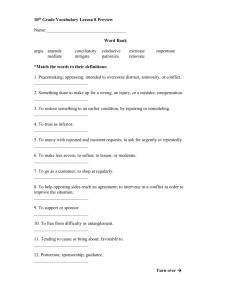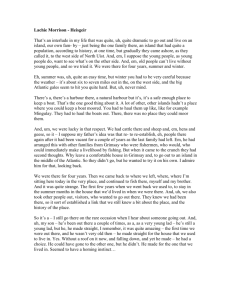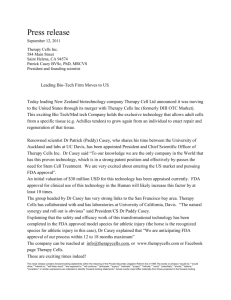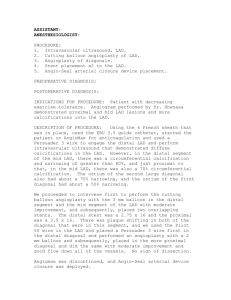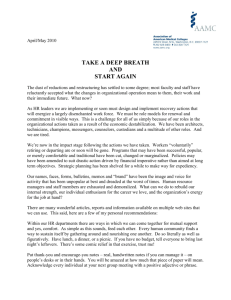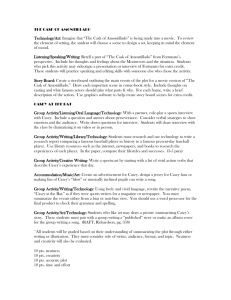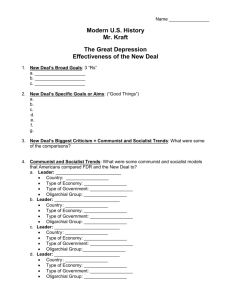Insistent Lad - Spokesman Books
advertisement
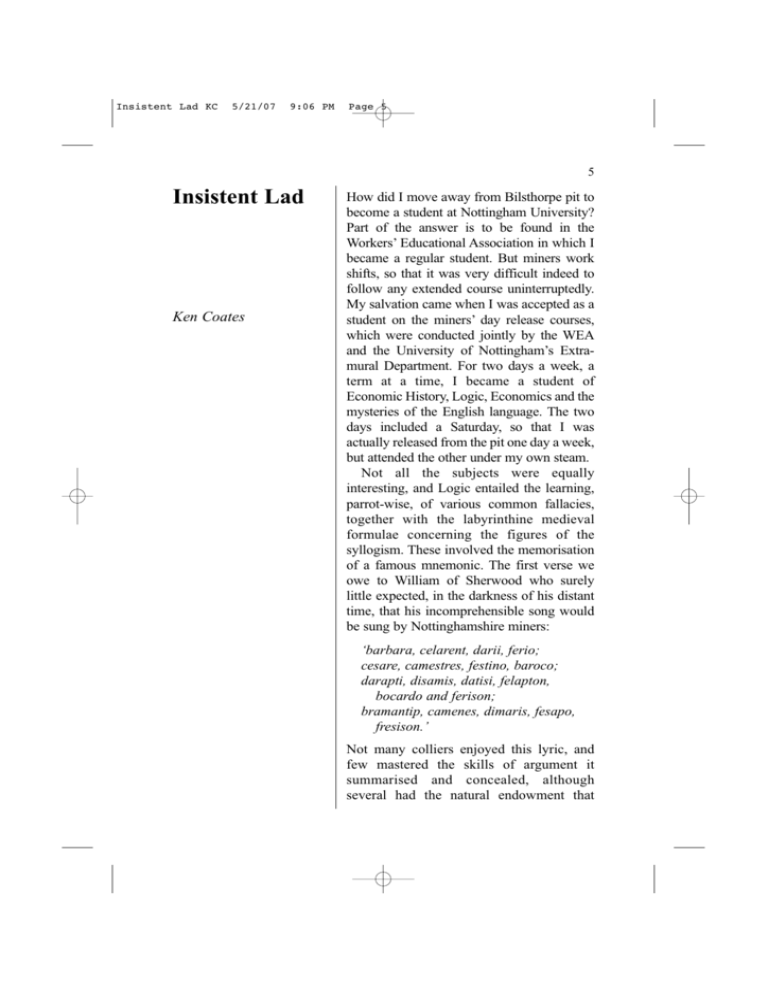
Insistent Lad KC 5/21/07 9:06 PM Page 5 5 Insistent Lad Ken Coates How did I move away from Bilsthorpe pit to become a student at Nottingham University? Part of the answer is to be found in the Workers’ Educational Association in which I became a regular student. But miners work shifts, so that it was very difficult indeed to follow any extended course uninterruptedly. My salvation came when I was accepted as a student on the miners’ day release courses, which were conducted jointly by the WEA and the University of Nottingham’s Extramural Department. For two days a week, a term at a time, I became a student of Economic History, Logic, Economics and the mysteries of the English language. The two days included a Saturday, so that I was actually released from the pit one day a week, but attended the other under my own steam. Not all the subjects were equally interesting, and Logic entailed the learning, parrot-wise, of various common fallacies, together with the labyrinthine medieval formulae concerning the figures of the syllogism. These involved the memorisation of a famous mnemonic. The first verse we owe to William of Sherwood who surely little expected, in the darkness of his distant time, that his incomprehensible song would be sung by Nottinghamshire miners: ‘barbara, celarent, darii, ferio; cesare, camestres, festino, baroco; darapti, disamis, datisi, felapton, bocardo and ferison; bramantip, camenes, dimaris, fesapo, fresison.’ Not many colliers enjoyed this lyric, and few mastered the skills of argument it summarised and concealed, although several had the natural endowment that Insistent Lad KC 6 5/21/07 9:06 PM Page 6 Resist Much, Obey Little enabled them to talk the hind legs off donkeys. The idea that I might become a full-time university student was fostered by the young man who taught us Economic History, who appreciated my essays and sought to get me admitted to his old department at Sheffield University. I was accepted, but my interests proliferated, and I soon found myself more attracted to following an English course. That became possible thanks to an Irishman. During these days, the BBC broadcast raw drama from Ireland, and one night I found myself listening to a play by Sean O’Casey called Red Roses for Me. It was about the adventures of a young man in the great Dublin strike wave, and I found it an electrifying experience. Sean O’Casey married severe realism to a wild sense of human potential. The strike became, in this crucible, not only a harrowing struggle, but also an extraordinary burst of hope and aspiration. O’Casey painted the prospect of a sunset over the River Liffey in which the entire city of Dublin was overwhelmed in a rage of colour. This was lovingly described by three flower sellers, and became an image of the world as it might be, clearly emerging from the troubles that presently possessed it. Another world, it seemed, was possible. So I read O’Casey, and I read him again. The other great ‘realistic’ plays were easy to obtain: Juno and the Paycock, and The Plough and the Stars. I followed through the entire cycle of O’Casey’s writing, including his remarkable six volumes of autobiography. Some time towards the end of this immersion, I plucked up the courage to write to the great man himself, and I sent him two letters, long since lost, to which he was kind enough to reply. Since then, David Krause has edited O’Casey’s surviving letters in four volumes, the first of which won him a Sunday Times award for Book of the Year. So Krause has done me the favour of summarising my youthful letters as follows: ‘I originally wrote to O’Casey to ask him his views on socialist realism, because I had been reading his work systematically, and had graduated from it to read Joyce. This had led me to the conclusion that O’Casey himself had nothing to do with socialist realism, and that if socialist realism had anything to do with art, it was purely accidental. His first reply clearly confirmed that he shared these views, so I wrote to him again, asking him why he did not express such opinions publicly, since if he and other great Communist artists like Brecht, Guttuso and Picasso were to speak up, the whole cramping, debilitating nonsense would be completely discredited. His second letter did not directly answer this question; but I read it as implying an answer, that if we “first removed the beam from our own eye” we should see that the enemy of art in Britain was not Zhdanov but the liberal establishment.’1 Insistent Lad KC 5/21/07 9:06 PM Page 7 Insistent Lad 7 At this time it was suggested that I might usefully apply for a State Scholarship to enter the university. About a score of these were issued nationally every year, each based upon the submission of an essay and an interview. Because of my total immersion in the work of O’Casey I chose to write about him. My quite substantial judgement was sent off, and I had almost forgotten about it when I was summoned for interview at the Ministry of Education. The experience was not daunting, although I had expected it to be. We had a pleasant chat about what I had written, and I was flattered to understand that the panel had actually read my piece. Subsequently I was informed that the Scholarship had been awarded. The officials at the pit surprised me greatly. My status heretofore had been that of resident subversive, and although I was tolerated, this was without enthusiasm. Of course the arguments inside the Communist Party were far removed from the Nottinghamshire coalfield, so that my somewhat anguished political evolution was a closed book, not only to my workmates but also to my bosses. So when I was sent for by the Manager, I wondered what trouble I was in this time. To my astonishment, he offered me his effusive congratulations. He knew that State Scholarships did not grow on trees and he was proud that one of his lads had been awarded one. Suddenly, all the officials became friendly. The Training Officer called me in to his cubicle, and showed me the extensive file that the Coal Board had been nourishing over the years, concerning all my troubled past. When I was eighteen years old, I had been sacked from one pit after drafting a letter to the National Union of Mineworkers calling for the equalisation of juvenile wage rates between the areas of Derbyshire and Nottinghamshire. Lads under twenty-one were paid according to markedly different scales in the two Counties, and the Derbyshire youngsters were substantially worse off under this system. All the lads therefore signed my letter, and it went off to the Union. The next week I had been summoned by the undermanager, who explained to me that I could play ball with him if I chose, and I would secure rapid promotion to the coalface. But I could go my own way if I wished, and retribution would not be long delayed. Naively I had explained that I had done nothing wrong, and that the working of the pit would be improved if the wages system was reformed as I had suggested. This advice was not accepted. A few days later I was sent to the job of driving a conveyer belt at some considerable distance from the coalface, and from all the other workers. My belt debouched on to another, and my task was to shovel up any coal that spilt to the ground during that transfer. Usually there was not much. But if the main conveyer stopped, and I was slow to switch off the Insistent Lad KC 8 5/21/07 9:06 PM Page 8 Resist Much, Obey Little subsidiary one, there could be quite a lot. But normally it was not an onerous task and on this morning I nodded off to sleep. The undermanager, riding down the belt, caught me, and sent me out of the pit. I was instantly dismissed. What I did not know then was that the bright young manager to whom he reported me had written a recommendation on my records, which now I was about to leave the industry, I was shown. ‘Do not employ this man. He is a dangerous agitator.’ So dangerous indeed, that he could be snuffed out without a murmur of protest at a moment’s notice. The only reason I had subsequently obtained employment at Bilsthorpe was that I had applied for jobs to several pits at the same time, and the damning records of my misdemeanours had been sent to another colliery, which had been slow in forwarding them on. So I got my new job, but was promptly placed on the socially devastating afternoon shift for a long time. The Training Officer should not have allowed me into the secrets of his files, but they did explain a number of events that had subsequently happened to me. Leaving Bilsthorpe I was admitted to the English Department at Nottingham University. Two political events followed immediately. Britain joined with France and Israel in the Suez war, and the Russians invaded Hungary following an upsurge of political opposition. In England, demonstrations were everywhere. I felt that the study of the silver poets of the sixteenth century was a little distant from the intellectual problems to which I needed answers, and so it came about that I transferred my studies to courses on Sociology and Politics. Two letters from Sean O’Casey2 To Ken Coates 1 JULY 1955 Dear Ken Coates, You are a young miner, a Communist, and you want to write. Well, you couldn’t want to do a worse thing. It is the most precarious of employments, without any chance of a dole. If you persist, then hold on to your job, and write in your hour of leisure; unless you can get another job that may be more suitable under the circumstances; but till you are sure of an alternative job, stick to the one you have. I couldn’t say for certain that I could see you if you came down to Devon. That would all depend on the circumstances of the time; I have a lot to do between work and family affairs, and can’t make definite arrangements to meet all who wish to come to see me. There has been a lot of ‘Socialist’ blather about ‘socialist realism’, without any who wrote about it having an idea of what it is or Insistent Lad KC 5/21/07 9:06 PM Page 9 Insistent Lad 9 what it meant. What is it, anyhow? Remember that Life comes first, even before socialism. A writer must write of the life around him; what he sees, feels, and hears, corresponding with life through his senses; there is no other way. And the life of England, of Ireland, Scotland, Wales, the Channel Islands, and the Isle of Man is a complex one, bewildering, lively, dull, selfish, generous, and so on. And what a complex thing is one human life alone! All it has to deal with, within himself, without from the life of others. Zhdanov – of whom you have heard, I daresay – didn’t know what he was talking about; and all who echoed him in the Daily Worker, and elsewhere, knew a damned sight less. Read Harry Pollitt’s writing, his ‘diary’ while he toured India, his biography, and, however good a lad he is – and he is clever, sincere, and good-hearted – he hasn’t the faintest idea of how to do it, or anything but the faintest idea about literature in general. James Joyce would but irritate him; and the same can be said for 90% of the Communists of England. They are shamefully and shamelessly ignorant of their own greatness in the achievements of the English people. The Soviet Writers are realising all this now. The other week, a prominent Soviet Writer came here to discuss with me a proposal to publish in the USSR all my biographical books, which, alone, shows the change that has or is taking place there in literary thought and desire. I wonder how many ‘communists’ have read Strindberg’s DREAM PLAY? Yet in this play, in a few lines, integral part of the drama, the dramatist proclaims the whole gospel of socialism. Again, Keats, who is never mentioned in the Worker, lets us know in fourteen lines the implication of all that Marx and Engels ever wrote. The worst formalism that I know of is the formalism of the chattering phrases uttered and muttered by the Communists themselves. The Communist must be interested in everything, must know something about everything; he must talk to the shepherd about sheep, the farmer about crops! I listen to the talk about farming problems on the BBC and Radio Eireann, whenever I get a chance – to the doctor about surgery and medicine, to the priest about religion, and to the worker about work. So, instead of going about always teaching, the Communist should be always going about learning. The Communists I have met, and I’ve met many, know too damned much, without knowing anything at all; a lot of them are the dullest humans imaginable; and do a tremendous lot of harm to the Communist cause. And because of this ignorance, they do the most stupid things. They don’t know how to talk about anything outside of a socialist pamphlet. They make me sick. Insistent Lad KC 10 5/21/07 9:06 PM Page 10 Resist Much, Obey Little Robbie Burns was a communist of his day, but he had time and the desire to sing ‘My love is like a red, red rose’. THE FLYING WASP (1937) has been long out of print. The critics didn’t like it, and no wonder. At the moment, oddly enough, I am going over it again, for it is to be published – or so the prospect goes – with other articles of mine, in a volume to be issued by a New York publisher. So one day – if your desires hold out – you may be able to get it after all. Finally, for I am very busy, don’t attempt to write, unless you feel an irresistible and insufferable desire to do so. Fight against the desire; but if it conquers, well, then, go ahead, in the name of God and Man; but hold on to a job till you KNOW that your work will bring in enough to keep you. All good wishes to the young miner. Yours very sincerely, Sean O’Casey To Ken Coates 17 JULY 1955 Dear Ken, You are an insistent lad. Sorry, I didn’t make my opinion clear in my last letter. Still, I’m not sure of what you want to know. First, I haven’t the faintest idea of what “Socialist realism” is, and I don’t think anyone else has either. I’ve read miles of opinions about it, from Zhdanov down to Howard Fast, and can’t yet get the swing of it. I don’t bother anyway to make sure, since I know something about the Realism and the Fantasy of life, which are more important than any theory. Yes, I agree that a lot of Communists are as dogmatic as any cleric; stupidly so; and I have had many a dose of boredom from them. But you have this ritualistic formulism or formalism among the liberal leaders of thought and literature here, just as many as in any other place. For instance, the Drama Critic of the TIMES LITERATY SUPPLEMENT said not long ago that ‘the British People had decided to ignore O’Casey because of his lamentable judgements’. There’s one for you. And, indeed, so they have, for it’s little I get from them, three times more from Ireland, and as much from Israel and Germany; but 95% of what I get comes from the USA. What in hell have you got to do with Zhdanovism? Is England not big enough for You? The USSR has her own way of walking, thinking, and hoping, and the Soviet People must evolve from their own environment and activities; England from Her’s, of which you are part. Communism will come, sooner or later, to all countries, but not necessarily in the same way everywhere. Insistent Lad KC 5/21/07 9:06 PM Page 11 Insistent Lad 11 It hasn’t come to the USSR yet; but, I believe, it is on its good way. What remains for all is to live in peace, and for each to work out its own salvation in its own way; and that is the way things will have to go now, for force no longer can be used without wiping out everything – Communism included. Zhdanov is dead. Out of date now; and always was. But remember, the artist everywhere will have a hard task to get a living; good even if he gets a loaf, a flask of wine, and a girl. I myself have been condemned by most; after JUNO, the Sunday Worker in a letter referred to me as Judas; Mike Gold, a prominent Left-winger in USA, after WITHIN THE GATES appeared in New York, wrote a whole seething column of abuse; the other day, 20 years after, he wrote another one bubbling with praise. What do I care whether he praises or blames? He doesn’t know a damn thing about literature or art. Read what Worsley said about SUNSET AND EVENING STAR. If these lads had the power that Zhdanov had, what would happen to us? Let us remove the beam from our own eye before we busy ourselves with the mote in our brother’s. The USSR is now beginning to prepare for the translation of my work – after 30 years of friendship. I’ve never asked them to do it; or have I ever asked anyone to take an interest in me – bar once when more than 40 years ago I sent an effort to G.B.S. for his opinion, and got a reply! This I acted on – ‘depend on yourself, and be published for your own sake’ – I suggested he should write a preface! By the way, the finest collection of Picassos is in the USSR, whose collection of Modern Art – got when they hardly had a red rex (a penny) – is second to none. Brecht is, I think, now in Moscow. I had his manager here the other day, who told me his ‘Ma Courage’ is to be done there. The USSR has respect for Hauptman. If you are going to write, write then, and don’t bother about the gibbering Marx-theorists, who can prate like Poll, but don’t understand in their minds what their mouths are spouting. This is the one and only way I suggest. You do as I do – if you write, write, and to hell with all opinions as to how you do it. Are you doing N.Service in the mines? Must end now. The God of Marx, Lenin, and Stalin (three geniuses) be with you. Sean O’Casey Footnotes 1 The Letters of Sean O’Casey, Volume III 1955-1958 . Edited by David Krause, The Catholic University of America Press, Washington, D.C. pp. 157. 2 As above, pp. 157-9 and 163-4. Insistent Lad KC 5/21/07 9:06 PM Page 12
